Pew Forum Faith Angle Conference
Key West, Florida
Watch more event video on the multimedia page.
More from the December 2007 Faith Angle Conference
Religious Literacy: What Every American Should Know
The Religion Factor in the 2008 Election
More: Research, news, blogs
Some of the nation’s leading journalists gathered in Key West, Fla., in December, 2007, for the Pew Forum’s biannual Faith Angle Conference on religion, politics and public life.
Given the recent popularity of several high-profile books on atheism, the Pew Forum invited Wilfred McClay, a distinguished professor of intellectual history, to speak on the historical relationship between religion and secularism in America. McClay argued for a distinction between two types of secularism.
Political secularism, he says, recognizes the legitimacy and even moral necessity of religious faith, while preventing any one faith from being established. Philosophical secularism, on the other hand, views religion more negatively and attempts to establish a common unbelief as a basis for government. Inspired by a recent trip to Turkey, McClay contends that the first understanding of secularism was at the heart of the founders’ vision and has resulted in a unique if imperfect mingling of religion and government in American public life.
Speaker:
Wilfred McClay, SunTrust Bank Chair of Excellence in Humanities, University of Tennessee at Chattanooga
Moderator:
Michael Cromartie, Vice President, Ethics & Public Policy Center; Senior Advisor, Pew Forum on Religion & Public Life
Navigate this Transcript
The American experience of church/state separation
Christianity and the two kingdoms
The establishment clause of the First Amendment
The two forms of secularism
Q&A with journalists
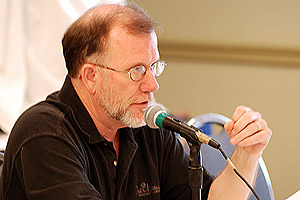
MICHAEL CROMARTIE: Ladies and gentlemen, if I could have your attention please. We’re beginning. It’s my privilege to introduce Wilfred McClay, who is Bill McClay to you.
Our session is called “Religion and Secularism: The American Experience.” It grew out of a concern at one of our discussions. Twice a year I meet with seven of your colleagues to talk about what topics we want to talk about at Key West, and one of the topics that came up at our last luncheon was the rise of the new atheism books. Now, Professor McClay is not going to be addressing that specifically, but [rather] the whole question of how we settled our disputes in American history between religious believers and secular believers, and Bill McClay is one of the finest people in the country to do that. He wrote an important essay in The Wilson Quarterly some years ago called “Two Kinds of Secularism,” [*] and I hope he’ll comment some on that today.
I call your attention to your packets, which include the bios of our speakers. I just want to say about Bill McClay that not only is he a professor of American intellectual history, but he wrote a book in 1995 [*] called The Masterless: Self and Society in Modern America. You want to know about that book because it was the winner of the 1995 Merle Curti Award in intellectual history, and I’ve always been wanting to ask Professor McClay, who is Merle Curti? But anyway, you won that award. It’s given by the Organization of American Historians.
UNIDENTIFIED: He [was] an American historian. He was [the] generation of-what-circa 1920 or [something like] that.
WILFRED MCCLAY: Oh, earlier than that.
CROMARTIE: But no relation to Merle Haggard? Okay. (Laughter.) We got that clear. Ladies and gentlemen, I give you Bill McClay.
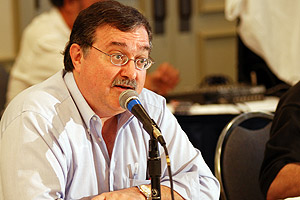
MCCLAY: Thanks, Mike. I’m very happy to be here. I know some of you, and I’m very happy to meet others whose names I knew before, and now [I] can put [them] together with the faces. I thought Stephen [Prothero’s] talk was really excellent, and the discussion excellent, and I hope I can build on that, and at the very least-This will be very historical and so if you need to catch a few Zzs, I won’t [mind,] I’m used to it. I teach in the university, so I have people sleep in my class on a regular basis, and it doesn’t bother me at all. (Laughter.)
Being a historian by training, I necessarily start out with [a] whole list of ticks and caveats. I do tend to think in terms of particular cases and situations rather than generalities, vast and otherwise. I’m not convinced that in my subject-religion and secularism and the relationship between them in American history-that I’m necessarily setting out some universal model that’s going to be universally applicable.
Also, there’s a problem with the word “secularism.” It means so many different things. Maybe the earliest meaning has to do with the clergy who were not monastics but who had their vocation in the world, and who were, therefore-the medieval church regarded [them] as lesser beings because they were not engaged in contemplation, which was the highest good. Obviously, we don’t use that meaning any more.
There are several other meanings to secularism, and the distinction I want to make is between philosophical secularism, which is secularism as a kind of godless system of the world, a system of beliefs about ultimate things, and secularism in a political sense: that is, secularism as recognizing politics as an autonomous sphere, one that’s not subject to ecclesiastical governance, to the governance of a church or religion or the church’s expression of that religion. A secular political order may be one in which religious practice or religious exercise, as we say, can flourish. So it’s distinct from the philosophical understanding of secularism.
As I say, to some extent the usage of these terms is defined by history, and I think we go astray if we try to define things too abstractly. Even the word religion, I think, may depend on: What religion are we talking about, and when and where are we talking about it? To pick an obvious example, it makes a great deal of difference when we talk about Islam whether we’re talking about Islam in Saudi Arabia, or Islam in Indonesia, or whether we’re talking about the Islam of the relatively tolerant 19th century Ottoman Empire, or the Islam of radical madrassas today, although all four of them have certain things in common, and they may have certain obstacles [in common,] relevant to our discussion today, to their ability to embrace Western European-style secularism in all of its senses.
Some of you probably have heard of Diana Eck. She’s a professor of religion at Harvard Divinity School, and she is a great proponent of religious pluralism. She has a saying to the effect that, “If you know only your own religion, you don’t even know your own religion.” I’m sure she says it more elegantly than that, but that’s the gist of it, and I was always dubious of this. It seemed a little too professorial and platitudinous.
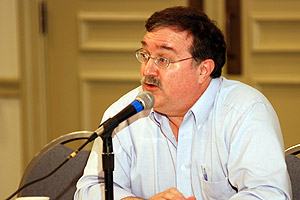
But I became a believer, shall we say, when I took a trip about a year ago to Turkey under the auspices of the State Department. Turkey [is] a country 95 percent Muslim, where other religions have no particular political profile or public profile at all. The imams are paid by the state. Religious garb, as you know, is forbidden in public institutions or by public officials because of the rigid secularism of the Turkish state. The Turks have a certain understanding of the separation of religion and public life.
What I was speaking about [in Turkey] was how Americans understand the separation of church and state, and I went all over the country speaking to various audiences about this subject, and they were absolutely fascinated. Many of them were very quick-Actually, they were interested to hear about America, and, in the question period, they asked me all sorts of questions about Turkey, which of course I was not competent to answer, but they immediately wondered if the American model might be a model for their own troubled secularism, which has arguably been too rigid, modeled on the French läicité model, which is a very, very forbidding and strict form of secularism. It proscribes public expression of religion to a very high degree.
Of course, there are those who-and they are represented in the rising of the AKP [“Justice and Development”] party and the rising, mildly Islamist elites-who want to see more religion in public life; they thought the American way was admirable in that extent. Of course there were others, particularly women, who were absolutely terrified by this because they immediately think of the Iranian example as the sort of thing they can expect to happen in Turkey if the Kemalist secularism of the past, 90 years or so, 80 years, is rolled back.
What I ended up having to say to these audiences again and again is that I didn’t know, [and] I doubted very much that the American way would be applicable. I was not being the Ugly American saying, “We know how to do it, and you should do it our way.” On the contrary, I kept saying again and again, “The United States has a unique history. Our ways of managing the relationship of religion and secularism didn’t arise out of abstract theory so much as it arose out of concrete practices that were a result of the particular circumstances that we had to manage, that the circumstances forced us to think as we do.”
I added that Americans are not in complete agreement about these things or [do not] view them as settled, that they’re constantly being fought over, constantly being contested, and that [it] is not such a bad thing that these are inherently conflict-ridden issues, and [that,] in fact, the American system thrives on conflict.
However, I did come away feeling it’s important to point out there [in Turkey] and here that Americans have managed to produce a pattern in the relationship of religion and secularism that differs in marked ways from the example of, say, the Western Europeans, and it’s a pattern that-as Stephen [Prothero] has already said-defies the expectations of many of the theorists of modernity, the exponents of modernity who all thought that secularization and secularism would be the same thing; that modernization and economic matters and commercial matters and so on would translate into the gradual disenchantment of the world and the evaporation of religious faith, [which] has manifestly not happened. So this is an achievement, even if it was not always [as] self-conscious [an] achievement as Americans would like to think; and it’s one I think we should understand better than we do.
 Video Highlight
Video HighlightAmerica’s ‘Particular’ Secularism (03:03)
Watch more event video on the multimedia page
So let me begin with two propositions. The first one is that in the American experience, the separation of church and state, which by and large we acknowledge as a rough-and-ready principle, does not necessarily mean the separation of religion from public life. Another way of saying this is that America has a strong commitment to secularism, but it is secularism of a particular kind, understood in a particular way.
Second, that the United States has achieved in practice what seemed impossible in theory: a reconciliation of religion with modernity, in contrast, as I say, to the Western European pattern. In the United States religious belief has proven amazingly persistent even as the culture has been more and more willing to embrace enthusiastically all or most of the scientific and technological agenda of modernity. Sometimes the two reinforce one another. Sometimes they clash with one another, but the American culture has found room for both to be present. I won’t prophesy this will always be the case, but it’s a very solid relationship of long standing.
And perhaps I should add-and I did this for my Turkish audiences; it utterly baffled them, but it shouldn’t be quite so baffling for you-that all this makes sense in light of the fact of [a] third proposition: that American institutions and culture are intrinsically and irreducibly complex-not chaotic, which is of course what they see-but complex.
The complexity takes a particular form: that politics and culture are designed around an interplay of competitive forces, which is, I think, the key to understanding a lot about the United States. The Constitution was based on the assumptions that in any dynamic society there would be contending interest groups, and [that] one could best counteract their influence by systematically playing them off against one another. That was the reasoning behind separation of powers. That was the reasoning behind the federal system. These different parts of the government are supposed to fight with one another. That’s how the Constitution is supposed to work.
People from abroad look at the American government and think it’s always on the brink of collapse. They don’t understand, and many of us don’t understand, that this is, in fact, the way it’s supposed to work. There are supposed to be countervailing forces holding one another in check. There is supposed to be common and constant tension.
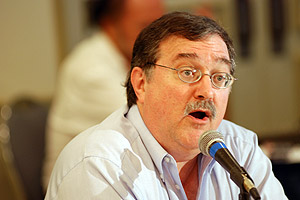
Socially and culturally speaking, the country has evolved in a similar way, not intentionally but with similar effect. No one at the time of the American founding envisioned the nation as a great bastion of cultural pluralism, in which a wide variety of cultural forms and religions would coexist. They probably would have found the idea unintelligible, but it turned out to be one of the most salient features of American life. Some of this was driven by religion-the desire of Puritans and Quakers and Baptists and other Protestants to worship God as they pleased-but a lot of it was driven by economics. When you have a country with an abundant supply of land and a scarce supply of labor, and you want to grow economically, you cannot be terribly choosy about the people who come into your country, and the immigration could not come from just England or northwestern Europe, so eventually Germans, Italians, Poles, Russians, Greeks, Turks, Chinese, Japanese, and so on would come. And the nation couldn’t afford in the long run to be too choosy about the religious beliefs of these new immigrants. Hence, the history of American religion and the history of American immigration often track with one another pretty closely.
That history affects the particular valence of the idea of the separation of church and state, as it’s understood in American history, in the way [for example] that Protestantism so often was used to reinforce the subordinate status of Catholics-I recommend Philip Hamburger‘s book on the separation of church and state about this.
I mentioned the JFK speech in the previous session. Another interesting thing about that speech, which I strongly recommend you all read before [Mitt Romney’s speech on] Thursday, is that it is a complete capitulation-I say this from a Catholic point of view; I’m a Protestant-but it’s a complete capitulation to the Protestant understanding of the separation of church and state. [Kennedy] is absolutely telling his Baptist audience exactly what it wants to hear in every detail. Fascinating.
The point is, however, that no one group ever entirely dominates, at least not for long, when the competition of political and social forces becomes as institutionalized as it has in the United States. Paradoxically, this competition has engendered habits of tolerance
 Video Highlight
Video HighlightSecularism, Religion and Modernity (02:56)
Watch more event video on the multimedia page
So what I’m arguing here is that social and religious tolerance became practical necessities before they became enshrined principles. The wars of religion in the 16th century in Europe fostered tolerance simply because of the inability of one religious party to dominate over the others, which meant that religion itself could no longer be a basis for public order and public culture. Something of the same thing happened in a far less violent way in the United States. This is one of the keys to understanding the relationship of religion and secularism in the United States. American secularism derived from the strength of religion, not from its weakness.
The ability of the United States, then, to reconcile religion and modernity depended in part on its ability to hold groups and ideas in competition with one another, and this ability has roots that go even deeper than the country’s actual beginnings. Ultimately, they are grounded in certain characteristic features of Christianity itself, which is one of the reasons why, when we talk about religion as if all and any religions can impart the same results, I think we’re misleading ourselves. There is something very particular about Christianity, a particular virtue it brings to the table in this matter, and that is its emphasis on what is variously called the two spheres or two kingdoms or two cities that have always been taken to divide up reality.
You’ll recall, since you all are religiously literate-I can assume this-that Jesus of the Christian scriptures surprised his followers by declining to be a political leader and declaring that his kingdom was not of this world; but at the same time he and his early followers, notably Paul, insisted on the legitimacy of worldly authorities and insisted that one should, in Jesus’ famous words, “Render unto Caesar what is Caesar’s,”-a really astonishing statement because it credits the secular authority with having a proper and independent role to play in the scheme of things. In other words, Christianity had certain theological resources available already at the very beginning for a kind of separation of church and state, although it did not come to pass fully until after those bloody wars of the 16th century had made the principle of religious toleration seem inevitable, and therefore, the need for a secular state.
Two kingdoms, two cities, two spheres-this feature of Christianity is one of the chief resources it has always brought to the problem of the organization of political life in a religious society, and it’s one of its chief resources now. [It is] something I’m not as knowledgeable about, but Islam seems to me to have a problem in this department.
Another feature that helped to establish the religious tone of early American history was the curious fact that the Europeans settling British North America were not merely Christians but [rather] the modernizing rebels within the Christian world. [These] Protestant Christian Reformers, whose agendas were various and much conflicted among themselves, had in common a rejection of the standard traditional hierarchy, priestly authority, and traditionalism of Roman Catholicism, and to some extent Anglicanism as well.
Many of these immigrants were openly seeking to restore the Apostolic church. That was their dream: to bring back the simplicity and mutuality of the church of Christ’s time and strip it away of all of the traditional encumbrances and barnacles that [had] accumulated over the centuries and get back to the simplicity and charisma and equality among members that was characteristic of the Apostolic church as you see it described in the Acts of the Apostles.
They all shared a belief, to a greater or lesser extent, that individuals could approach the Holy Scriptures, which were taken to be the ultimate authority, unaided and enjoy through the scriptures an unmediated relationship with God, and that the measure of one’s faith was not a church membership or the reception of the sacraments from an authorized priest, but whether one had experienced the relationship with God through Christ freely, firsthand, and in a way that was most reliably expressed by conversion. Of course, in early Puritan congregational churches, the sine qua non for admission to the church was [to] deliver a convincing conversion narrative, which the elders in the church would find sufficiently persuasive to believe you’d really had the experience you claimed to have, and so you were in.
The individual conscience in this view is the ultimate measure of authentic faith, and [the] individual conscience should never be coerced by priests or ecclesiastical traditions or anything else aside, of course, from the Bible itself. This very individualistic, voluntaristic, Protestant approach to religious faith and the absence of any serious opposition to it led America to a high degree of democratization of religion. Religion was more market-driven, more even consumer-oriented, as has been described. People could affiliate or not affiliate by choice precisely as their consciences dictated.
Far from undermining religion, this voluntarism made it thrive in modern America, and I think one can probably attribute the ways in which the face of evangelicalism [and] even non-evangelical varieties of Christianity [and] Roman Catholicism [have] come into play through that pervasiveness of this market-driven approach to religion. Also helping along the reconciliation of religion and modernization was the fact that both secular and religious thinkers so often agreed on things for a long time in American history. There was very little conflict between the more secular-minded and the more religious-minded over, for example, the drafting of the Constitution. The conception of the Enlightenment as essentially anti-clerical, irreligious, rationalistic [and] philosophically materialist is a generalization from the French experience, which doesn’t fit the American one, just as the American Revolution was a very different kind of revolution from the French Revolution, [in being] much more self-consciously backward looking and even restorationist
The U.S. Constitution and the First Amendment to the Constitution were not intended to create a purely secular government, neutral or indifferent to religion as opposed to irreligion. The Constitution itself, at the time it was drafted, was largely a procedural document, which sought to enumerate carefully the powers of the national government while leaving the police power and most substantive questions of morality, religion, education, and such, to the states-I’m talking about the Constitution as it was drafted; not as it’s been interpreted.
 Video Highlight
Video HighlightThe Founders’ View of Establishment (01:05)
Watch more event video on the multimedia page
Furthermore, the First Amendment, which prohibits the establishment of a religion and protects the free exercise of religion, was not intended to secularize the national government, but instead to protect against sectarian conflict and exclusiveness and the power grab by some national church. The founders understood the term “establishment” in a very specific way as referring to a state church established by a national government that could command assent to, or at least privilege, its doctrinal statements, receive tax monies-that’s the important thing-to support it, and perhaps require attendance at its services. But certainly tax revenues [were] the main thing.
The founders did not want this. They prohibited the national government from doing it, but they prohibited only the national government from doing it. They did not prohibit the states from doing it. The First Amendment not only leaves open the possibility of state establishments, but in fact there were state establishments of religion, mainly in New England, I think, up to the 1820s; isn’t that right, Steve? 1828 was the-1833, okay.
It’s interesting that Jefferson’s famous “Wall of Separation” letter was a response to the Danbury Baptists [letter,] which had to do with the Baptists’ concern over religious establishments in Connecticut. They were actually appealing to Jefferson: “Couldn’t you just do something about this establishment in Connecticut, which we really don’t like and is very oppressive to us?” Jefferson, [who] wasn’t about, at that point in his presidency, to use [his] power that way, politely didn’t give them what they wanted. So even Jefferson implicitly acknowledged the acceptability of a state establishment. Of course, he didn’t like to have any kind of religious establishment.
Soon after passing the First Amendment, Congress passed a resolution proposing a National Day of Public Prayer and Thanksgiving, on which President Washington soon acted. Congress also provided land for churches and mentioned the necessity of religious education in the Northwest Ordinance. Thus, the people who actually voted to ratify the First Amendment saw no incompatibility between the establishment clause and government support of religion on [a] state level, not on the national level.
More generally, to go back to the point I made earlier, 18th-century Americans experienced surprisingly little tension between their version of the Enlightenment and their version of Protestantism. In many ways, the two were entirely complimentary. Both emphasize the central importance and independence of the individual conscience. Both embrace the absence of religious establishment. Both eschewed the use of coercion. Whatever the theological differences [were among] figures such as Benjamin Franklin, John Adams, George Washington, James Madison and Thomas Jefferson, [these men] were of one mind in endorsing the crucial importance of religion for the sustenance of public morality.
Now, they may have thought religion was “a good thing”-as people used to say about neoconservatives, [they think] religion is a good thing for other people to have-but [they made] a very strong endorsement of the need for religion to be a force in public life, as a part of public discourse affecting the public sphere. The single best analyst of all of this, [and] I wish I could come up with [a] name you hadn’t heard before, but [it] is Alexis de Tocqueville. [He is] still the best analyst, whose experience of France-again, the comparative dimension-brought home to him during his visit to America in the 1830s how remarkable it was that the spirit of liberty and the spirit of religion co-existed and reinforced on another in the American context, in a manner that was completely contrary to the French historical example.
Tocqueville, of course, is known for producing a very memorable portrait of America as a middle-class society, in all the best and worst senses of that term, and a feverishly competitive, commercial, acquisitive, practical-minded, jealously egalitarian and, of course, restlessly mobile society. He saw the chief dangers in the society as the twin phenomena of individualism and materialism, the tendency of citizens to withdraw from public life and regard themselves as autonomous actors with no higher goal than the pursuit of material well-being. Tocqueville was a great believer in the need for public virtue, but he realized that a modern commercial democracy was not going to naturally produce such qualities in human beings. So, what to do? How to counteract the corrosive tendencies of a commercial democracy? His notion was that self-interest, rightly understood, could serve in the breach as a kind of antidote to those tendencies, but self-interest, rightly understood for him, meant that religion had to be a very important part of American life.
Tocqueville was very impressed by the degree to which religion persisted in the American democracy and that religious institutions seemed to support American democratic institutions. The latter seems unexceptional to us, but from his point of view it was very surprising. From a French point of view, if you were a liberal in politics, you had to be anti-clerical; the educated Europeans were abandoning religious faith and practice in the belief that the spirit of liberty was incompatible with the spirit of religion, and one was, in a sense, forced to vote the straight ticket. To be a political liberal, you had to be an ecclesiastical one, and vice versa. But Tocqueville’s visit to America convinced him that liberty and religion were not necessarily opposed to one another and their antagonism or attention was not necessarily a bad thing.
In America, religious beliefs and institutions restrained self-assertion in ways that simulated the effects of virtue and made the exercise of freedom more stable [and] more effective. He even went so far as to say that for Americans, religion was the first of their political institutions, indispensable for the maintenance of republican government. What Tocqueville was describing, in fact, is a distinctly American version of secularism, a secularism in which, still, religion is the first of American political institutions-a paradox. It points in the direction of a useful distinction, which I made briefly at the outset, and [which] I’ll [make in] a little more detail here, between two broadly different ways of understanding the concept of secularism, only one of which is hostile or even necessarily suspicious of the public expression of religion
On the one hand [is] as a way of understanding the secular idea as an opponent of established belief, including a non-religious established belief. This is something like the political secularism I was talking about at the outset. It also protects the rights of free exercise and free association. I think the latter of those [two] is very important because free exercise can be an entirely individual right, but [with] religion being a social institution, freedom of association is necessary for that exercise to be complete.
On the other hand, the second understanding of secularism understands the secular ideal as a proponent of established unbelief, and as a protector of strictly individual expressive rights, a category that includes the rights of religious expression. So the right of protecting what might be called the corporate liberty of religious associations is not necessarily included in that; religion is an entirely private and individual matter in which one should have maximum freedom as long as, you know, one doesn’t scare the horses or otherwise disturb the public peace. It’s an individual matter. So this second kind of secularism is closer to what I called at the beginning philosophical secularism.
The first of these is a fairly minimal, even negative, understanding of secularism in the same way that Isaiah Berlin talks about negative liberty. It’s a freedom from imposition by any kind of establishment on one’s freedom of conscience. For it, the idiom of secularism is a kind of lingua franca, which serves to facilitate commerce and communication among different kinds of belief but that doesn’t make any claims for the absolute character of reality; [it] doesn’t claim to be an Esperanto that has taken all the messy languages of the historic faiths and translated them to [a] pure and solid gold one. Secularism in this view is a more provisional thing. It’s an account of the rules of engagement rather than the content or results of the engagement itself, and it’s compatible with very strong religious commitments and very liberal free exercise of religious sentiments.
The second view, what I called the philosophical view or the positive view, is much more assertive, more robust, more positive by affirming secularism as an ultimate and alternative faith that rightly supersedes the tragic blindnesses and, as [Christopher] Hitchens would have it, [the] “poisons” of the historical religions, particularly so far as activity in the public realm is concerned
The first of these secularisms-the limited one, the political one, the negative one, whatever term you want to use-resembles the language of the First Amendment and the practice of the First Amendment as it’s evolved over much of American history, although Supreme Court decisions [have gone] back and forth on different aspects of it. It looks toward a non-established secular political order, one that’s equally respectful of religionists and non-religionists alike. Such an order preserves a core insistence on the freedom of the uncoerced individual, that fundamental Protestant principle, but it also has a more liberal, more capacious understanding of the religious needs of humanity, and therefore doesn’t presume that the religious impulse is merely an individual matter; or as one Supreme Court decision put it, something that we tell ourselves about the mystery of human life.
On the contrary, it would insist that religion is a social institution for whose flourishing the rights of free association are necessary. It insists that pluralism, rightly understood-pluralism having to do with the corporate liberty of groups-is a necessary concomitant of liberalism because we are social creatures, because our social existence is a prior condition of everything else that we value.
This American understanding of secularism is different from the strict läicité of the French and the Turks, and one should admit it is not perfectly observed by Americans themselves. It’s a very difficult ideal, I think. There’s a tremendous and understandably human desire to line all our commitments up with one another and to have our philosophical and political and other convictions all in accord. But it may be [required] in the long run, as many political things require us, to renounce the things we would like to put in a line. It may be a far more workable approach to the idea of secularism than the alternative, precisely because it can draw on the moral energies of the historic Western religious traditions at a time when, arguably, the West is badly in need of them, and one need not be a religious believer of any kind to accept that this may be so.
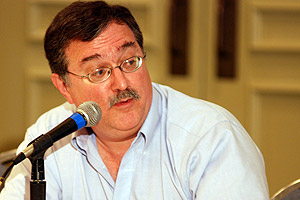
In this connection, I just [have] a few final comments. It’s interesting to [note] that no less of a prominent secular figure than the German philosopher Jürgen Habermas started a dialogue a number of years ago with Cardinal Ratzinger, now Pope Benedict XVI, about some of these issues, driven in Habermas’s case by his concerns about biological engineering and particularly human cloning. Habermas saw [the prospect of human cloning] as an assault on the fundamental dignity of the human person, and he was interested in engaging Ratzinger to see what resources there might be in the Christian intellectual tradition to make sense of these impending phenomena. In a fairly recent interview, about two or three years ago, he said the following-and I warn you in advance that Habermas, [to] those who have read him, makes John Dewey look like Mickey Spillane by comparison. So [it] is very turgid prose, but it’s important.
This is Habermas translated into English; he’s actually better translated into English than [in] the original German:
“For the normative self understanding of modernity, Christianity has functioned as more than a precursor or catalyst. Universalistic egalitarianism, from which sprang the ideals of freedom and a collective life in solidarity, the autonomous conduct of life in emancipation, the individual morality of conscience, human rights and democracy. These are the direct legacy”-this is the important sentence-“These are the direct legacy of the Judaic ethic of justice and the Christian ethic of love.”
He’s putting more emphasis on ethics than Stephen [Prothero] would like here, but it’s an ethic that derives from a metaphysics. What he’s saying, translated into less opaque English, is that the religious heritage of the West is not easily dispensed with, [at least] not without also endangering the perpetuation of many of the good things that that heritage has helped to give rise to. I’m reminded of a wonderful saying of C.S. Lewis’s, which he used in a different setting, but I think equally applicable here, that it would be like the scent of the rose turning against the rose and attempting to destroy it.
It’s particularly striking, by the way, that issues of bioethics seem to have been what pushed Habermas to reconsider his views in the matter, and that, I think, is indicative of the difficulty-I won’t say the impossibility-that a strictly secular understanding has in addressing effectively the problem of the instrumentalization of human life, which replaces transcendent notions of human dignity with … what? For a long time, the theological melody of the past has lingered on, but [it] might not forever.
Let me say finally-Mike is pressing me to wrap up-one other thing that Stephen [Prothero] has alluded to. This is one final observation about the relationship of religion and secularism in American life, and that is this: that the most successful movements for social reform in American history are likely to have had, at the very least, a respectful relationship to the country’s religious heritage, if not being driven by it. One might cite, not only as Stephen did, the civil-rights movement, certainly the movement for the abolition of slavery, which was an even more religious movement, or women’s suffrage, or even the American Revolution itself are examples of this. The interesting thing in each case is that one can find both religious and secular rationales for change, in which the two sets of justifications were mutually supportive and even mingled to an extent that would be unthinkable in other cultures.
That congruency, that mingling, is a key element in the genius of American politics and of American religion. That’s why Martin Luther King’s finest rhetoric can, with equal plausibility, not only invoke the prophetic books of the Bible, of the Old Testament, the Hebrew Scriptures, but also the Declaration of Independence and the Constitution and the words of the founders. And why when Stewart Burns wrote a biography of King, he was not being fanciful in calling [King’s] lifework “a sacred mission to save America.” We enshrine the separation of church and state, but at the same time we practice the mingling of religion and public life. It’s not always logical, but there are times when it makes good sense.
It is not to deny that there aren’t religiously grounded arguments against such admirable changes, notably the case of slavery, [which] has already been mentioned, and is not to deny that sometimes religious and secular arguments for reform [support] bad ideas, like prohibition. Nothing in life is foolproof; one can find secular and religious justifications for that statement. But there are almost no examples in the American past of successful, widely accepted reforms that do not pay their respects to both America’s religious and secular sensibilities. The way I like to put this-and [this is] my final statement-[is] they are required to pass through a bicameral body politic, both religious and secular. Thank you.
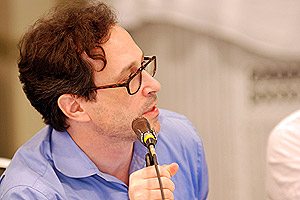
DAVID VAN BEIMA, TIME: Hi. Two questions. The first one is that among some evangelical thinkers these days you hear people talking about how to preach the gospel in a post-Christian country, and I think a lot of the premises of that statement probably are at odds with the kind of thought that went into what you were talking about, but at the same time, I’d be really interested to hear your analysis of both the premises and the argument.
The second question is, you’ve talked a lot about the origins of secularism A, but aside from mentioning France briefly at one point, not so much about the American tradition, such as it is, of secularism B, and I’m wondering whether it has a strong enough tradition to speak of.
MCCLAY: The second one’s easier than the first maybe, but what I’d say about the rhetoric of post-Christian America is that, in a sense, it’s not anything new. One of the aspects of being a fundamentally Protestant country-and I don’t mean that in the sense that John McCain was talking about, whatever he meant when he said that-but one of the features of having Protestantism as foundational is that we have this rhythm of revivalism built into the way we do business in religion. There are these periods of decline and then renewal and decline and renewal. The Awakenings are all, however many one credits there as being-four, five even, certainly two, although I guess Jon Butler doesn’t even think there was one.
A certain revivalistic spirit is very much a part of the way we do things. If you look at it in the time leading up to Cane Ridge and the Second Great Awakening, you see all these denunciations of the country as having lost its way and lost the spirit of ’76 and lost the faith of the fathers and the descending into iniquity; and then, boom, comes an awakening. So there’s a bit of an academic patina to some of the arguments you’re talking about, at least the ones I’ve read, where they like to talk about post-modernism and show they’ve been to college. But I don’t think it’s really that different from the path of revivalism as it’s been taken in the past.
VAN BIEMA: What they’re describing is the situation that tended to precede revival?
MCCLAY: Yes.
VAN BIEMA: So that means essentially you’re in agreement with them, that there is some general absence of a religious approach to things?
MCCLAY: Yes, but of course saying “post-Christian” is implying a kind of historical vantage point that they don’t really have. One can’t know for another 200 years or so whether it’s really a post-Christian time, but yes.
CROMARTIE: We’ll be meeting here about that.
MCCLAY: If the waters haven’t risen and swallowed up Florida.
To your second question about secularism B and how deep its roots are in America: not very, I think. Tell me if I’m answering a different question than the one you asked, but the fact that it’s absolutely inconceivable that an openly atheistic candidate could even consider running for the presidency is an indication, I think, of how-there’s a lot of agnosticism and a lot of indifference, but a commitment to secularism as an agenda? There’s very little of that.
It doesn’t seem to me to have deep roots, even if you look at figures like John Dewey. Dewey came out of liberal Protestantism and a lot of American secularism is an etiolated version of liberal Protestantism. Dewey had the notion that something like religion was necessary, so his book A Common Faith in the ’30s was an attempt to provide a religion without religiosity, without supernatural beliefs, just trying to capture the essence of it. Even he wasn’t comfortable with a kind of raw, Jack Webb-form of secularism.
VAN BIEMA: To the extent that secularism B is a mistrust of religion in the public square-is that one way of putting it? That was the sense I was getting from you-does that have antecedents?
MCCLAY: I think a distrust of religion in the public square actually is very widely shared by people who would not describe themselves as secularists at all, and, yes, I think that’s been true for a long time.
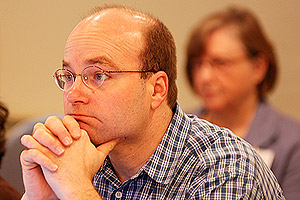
MIKE ALLEN, THE POLITICO: Thank you for mentioning your familiarity with the Kennedy speech. There was an ABC news piece that was posted today [dated Dec. 2] that posited that the speech that has become so famous, A, was not the first or only place where Kennedy dealt with that issue, and B, that it really did not defuse the issue for Kennedy. This was something I had never heard. Is there something of an urban myth around the Ministerial Association speech, or do you think it was as it’s been described?
MCCLAY: I wanted to go look at it, as I did a couple months ago when we started hearing people say, “Romney’s got to give a speech like Kennedy gave.” I looked it up, and I don’t know that I’d ever read it before, and I was quite underwhelmed by it. It did seem to me a complete capitulation to just what a separationist Baptist would want to hear. I do have the impression that, from various accounts of Kennedy’s life that I’ve read, that it did defuse the situation, but that may well be an urban myth. I don’t know. Stephen, do you know anything about that?
STEPHEN PROTHERO, BOSTON UNIVERSITY: I do think it is more recent interpretation that that’s what did it for him, but it was touch and go, honestly, up through the election on whether he had done enough with his Catholicism problem or not.
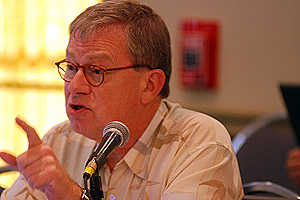
MICHAEL BARONE, U.S. NEWS & WORLD REPORT: The Gallup Poll tells us that Kennedy got 78 percent of the vote [inaudible] the Catholics, and Nixon got 63 percent among white Protestants; which says that the extra 101,000 votes that Kennedy got was the difference, but it was a very close run.
It is my recollection of looking at the polling throughout that campaign that there was very little variation from May onward. Nixon and Kennedy were always between 45 and 50 percent, and the political writers of the day and Teddy White all kept saying, “The tide has shifted because it’s shifted from two points for Nixon to three points for Kennedy,” which, of course, are the same numbers.
You can see sectarian voting all over the country in looking at county data. I won’t go into any more detail.
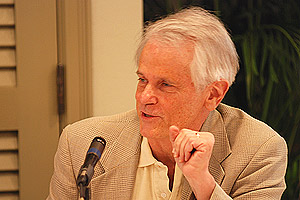
SHELBY COFFEY, THE NEWSEUM: Those of us who followed the Luce press, in Time and Life, could see exactly how that meeting was interpreted by the establishment, because if you go back and look, the faces of the people in the Baptist congregation were contorted, angry; and Kennedy looked cool as a cucumber. So in the lead opinion, I think it made a difference.
MCCLAY: You’re talking about the [Greater] Houston Ministerial Association, the audience was contorted and-
UNIDENTIFIED: Yes, maybe John will bear-
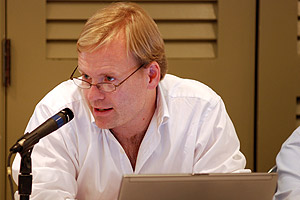
JOHN DICKERSON, SLATE: Having read some of the clips last night from the 13th of September, it was a lion’s den speech. This young senator just going there-it was an act of boldness; like when he went and spoke to the Texas delegation in the 1960 convention. It had its religious component, to be sure, but it was also an act of political theater that he stood up.
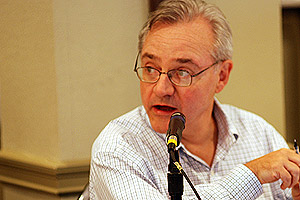
E.J. DIONNE, THE WASHINGTON POST: I just happened to look up-because I have this computer here-Stevenson got 37 percent of the Protestant vote; Kennedy got 38 percent. That suggests Kennedy really did take a hit because Stevenson got absolutely clobbered in 1956, and there’s evidence that Kennedy lost Ohio because of a swing in southern Ohio. I think that’s right, Michael, that he did not defuse it, but he defused it enough and then won his big Catholic landslide. For people who care, if I can plug a friend, Shaun Casey at the Wesley Theological Seminary is completing a book on Catholicism and the 1960 campaign. Apparently he’s found some fresh material. So he might be somebody to talk to. In fact, now that I say it, I think I’m going to call him myself.
CROMARTIE: Dan Harris, are you the one that gave us the ABC news report that Mike Allen just cited?
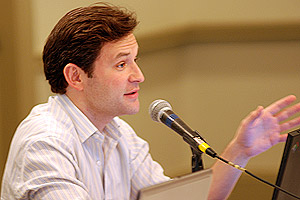
DAN HARRIS, ABC NEWS: In keeping with Mike’s habit, now, of ripping off ABC news, he also ripped off the question I was going to ask, but-
MCCLAY: So we should give you a hat tip. (Laughter.)
UNIDENTIFIED: Hat tip to ABC News.
HARRIS: We are on 6:30 nightly on the East Coast. (Laughter.)
I would like to hear you elaborate a little bit on your critique of the Kennedy speech, given that you just read it again recently, from the perspective of the separation of church and state, and also as it pertains to Romney, and what you would advise him based on your-
MCCLAY: I’d rather do it in terms of the latter material. I think it was probably exactly what needed to be done at the time. What I said earlier was that it’s striking to me how inadequate it would be now to simply say, particularly for Romney and his situation, “We believe the separation of church and state should be absolute,” as I believe Kennedy says. It’s very strong language about the degree of the separation, and that the religion of the candidate should have nothing to do whatsoever with the view of the electorate of his capacity for office.
CROMARTIE: Or his own personal life.
MCCLAY: Well-(laughter.) That is one difference between now and then. We feel that we have the right to ask candidates whether they wear boxers or briefs, or diamonds or pearls, or whatever. There is an invasion of their personal life that is obviously not entirely a good thing.
But I think what Romney needs to do-and I’m not saying this as somebody who supports him or favors him or anything like that-To do what needs to be done, he will have to go further than that and say something about the content of his faith and why it is congruent with the American civil religion, that is, with this basic residuum of shared commitments and convictions about the meaning of the American experiment.
I don’t think it’s enough for him to say what up to now it seems to me he’s been saying: in effect, “None of your beeswax,” or “We believe in religious liberty. Get off my back.” That may be a good legal strategy, but it’s not a good political strategy. He has to give us a reason why his religion is not only not a liability-or should be bracketed-but why it’s an asset. I think if he does a rerun of the Kennedy speech, it won’t work for him.
HARRIS: Were there hints in the Kennedy speech as it pertains to separation of church and state that you found objectionable? You’ve used this phrase “capitulation” a couple of times.
MCCLAY: No, I’m simply saying that if I had looked at this as a Catholic-[Kennedy] was very proud of the fact, and maybe I should ask E.J. to comment on this-that a Catholic was this far away from winning the presidency and was not concealing his Catholicism, thought not talking a whole lot about it, either. I think I might have been disappointed that he, in essence, said, “I view these matters in the same way that a Southern Baptist would,” Baptists being known for their separationist views, in those days, not so much now. I’m not sure what I would have wanted him to say, but I think I would have wanted him to do more, although I think that John’s point about the mise-en-scène is really important. There’s not a whole lot more you can do in the situation where the lions are all running around you and growling. Just to show up is pretty impressive.
DIONNE: There were splits among the bishops even on Kennedy’s candidacy. There were debates about whether he was going too much in a secular direction. But I think you’re right that most Catholics wanted to let him off the hook and do whatever he had to do to push this issue aside. Clearly, the 80-20 margin he won among Catholics suggests that’s true, which was a huge 30-point gain on Eisenhower. They were willing to let him do whatever was necessary. But I think you’re right that the content of the speech is much more Protestant than it is Catholic.
KATTY KAY, BBC: You said just now that Romney will have to say something about this faith. I guess that’s the big question: What does he have to say about his faith?
MCCLAY: You get into territory here where I’m not sure I could be of much help. But let me approach it this way. The antagonism between Protestants and Catholics is such a powerful theme in American history. I find my students are completely uncomprehending of this, so much has the world changed. But in 19th century American history, it is one of the greatest themes, again and again and again interjecting itself into everything.
How did all of that change? That’s a long story, but I think part of what happened is that the theological differences, while they still exist and are important to some people, became mitigated somewhat because, for various reasons including the second World War, Protestants became convinced that Catholics were no longer-I hate to use this language-but no longer “the other.”
They were not incomprehensibly different: They were regular folks, and they had certain views that Protestants regarded as odd, just as vice versa, but a social comfortableness-and I mean social in a larger sense, not just belonging to a club together or something like that, but a general, cultural comfortableness-in the coexistence of Protestants and Catholics led to the theological differences being bracketable and not really that important anymore.
I think something like this could, conceivably, be done with Mormonism. What would be a very big mistake-as it would have been for Kennedy-is to play up the history of oppression. Certainly Mormons have a story to tell there, too, very much so. With Romney, you do feel there are times-you all follow him more closely than I do- but there are times when you feel a certain anger in him that may reflect some of that sense of having been victimized in the past, of Mormons having been marginalized or otherwise dissed in American life. I think it would be a big mistake for him to go down that road.
CROMARTIE: Let me just interject here, if I could. Anybody here from Boston? How did he do this as governor?
UNIDENTIFIED: In New England, we don’t talk about it. (Laughter.)
UNIDENTIFIED: He totally ignored it.
CROMARTIE: He ignored it, and he’s going to try that here.
UNIDENTIFIED: When he ran against Ted Kennedy, this was something that Joe Kennedy raised as an issue, the Mormonism issue. [Romney] invoked the Kennedy speech in his own defense and did bring up the whole idea of a disenfranchised group that time.
UNIDENTIFIED: He out-Kennedy-ed Kennedy.
MCCLAY: I happened to be living in Massachusetts when he ran against Teddy Kennedy for the Senate, and the Mormon card was played. It wasn’t played [directly]-it was played through operatives, but it was played, and it worked.
UNIDENTIFIED: But Michael, to use a Romney word, it was unbecoming to bring that up in that context.
PROTHERO: It’s the least evangelical part of the country, and New Englanders accept this public-private distinction. And so, they didn’t ask. It was unseemly to worry or to ask about it.
DIONNE: There’s no place that the Kennedy ’60 campaign had a greater effect than Massachusetts, so there’s reluctance, special reluctance, to use religion even though, you’re right, Ted Kennedy did try to use it when he thought he was really in trouble.
UNIDENFIED: (Inaudible, off mike) – he and I both having grown up at the same time in the same place were marked indelibly by that, more by that than by any other factor in our lives.
MCCLAY: I have a relevant comment, and I am looking at Michael Barone because I have a feeling he may have something to say about this. But I know nothing about the extent to which Mormonism came up when George Romney was running for office.
BARONE: George Romney was running seven years after the Houston minister’s speech and after John Kennedy had been generally considered to be, A, a successful and popular president, and, B, one whose religion played no part whatsoever in his public decision making. My recollection, as a resident of Michigan at that time, or a voter there, was that it played almost no role at all. That was when the church had not yet allowed full membership to blacks. That came in the 1970s. That’s what Joe Kennedy brought up against Mitt Romney in Massachusetts in ’94, attacking a church doctrine which, by then, had been repudiated 16 years earlier. So George Romney benefited from that Houston minister’s speech.
DIONNE: I had a student who wrote a brilliant paper on this very subject. He went back and looked at a lot of stuff, and it was not an issue at all. Interestingly, George Romney also refused to use Mormon networks to fundraise. In other words, George Romney was an arch-separationist himself, which probably helped. But it was not an issue at all according to my student’s research, and I have no reason to disbelieve it.
CROMARTIE: Katty is going to be seeing Governor Romney tomorrow. Please tell him we have a lot of people with advice for him.
KAY: I’m going to follow up because you said what Governor Romney shouldn’t say, but you didn’t say what you thought he should say. (Laughter.)
MCCLAY: I’m not sure, but I think he needs to make it clear that there’s nothing in what he believes, and in the Mormon faith as he understands and practices it, that is in any way in conflict with fundamental American commitments and that, in fact, it reinforces them. I think that case could be made. This is one case where I think maybe staying away from the doctrine, staying away from the social separation of Mormons, and concentrating on a fundamental ethos would serve him best.
He definitely needs to stay away from the parts of Mormonism that most people are going to find strange and off-putting, although he can’t be seen as avoiding the subject. It’s a very tricky thing. I don’t think this would be so hard for him if he hadn’t waited so long to do it. He clearly doesn’t want to do it, which makes me think he won’t do it very well, but-
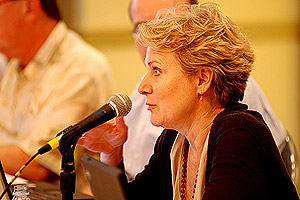
KATHY SLOBOGIN, CNN: I was struck by your description of a successful reconciliation between modernity and religion in America. My understanding of a force that has so changed American politics in the last 30 years-the rise of the religious right, the Christian fundamentalists and evangelicals getting into politics in a big way, which is something of a departure for them, at least in the 20th century-is that that is, in fact, a rejection of the status quo and a rejection of the balance between the sacred and the secular in this country and a reaction against the fact that religion has been pushed so much to the periphery of the public square. I’m wondering whether your more sanguine description of this goes all the way to the present day, or does it stop in 1979 when Jerry Falwell basically declared war on secular America?
MCCLAY: I’d put it a little differently. If we’re talking about a reconciliation of religion and modernity, in some ways, nobody has done it better than the mega-church building, media-savvy evangelicals-they are not rejecting modernity, per se. They are, in fact, assuming that you can take certain features of modernity and put them to work for the sake of traditional core values that they see as being fundamental. We’re not looking at people who think we need to foreswear all modern conveniences and live like Amish or Luddites.
SLOBOGIN: I’m talking about people who think it’s a Christian nation, that there should be prayer in the schools, that there should be more religion in the public square than there was before 1979.
CROMARTIE: But there was prayer in the schools.
MCCLAY: It would help me if I knew who you were thinking of. I have trouble with this kind of discussion because I’m not always sure who we’re talking about.
SLOBOGIN: It’s just that the rise of the religious right is often described by people who follow these things as a reaction against secularism, against the degree to which America had become a secular country. So maybe I didn’t put it very well.
MCCLAY: Again, it depends on what you mean by secular. If you mean this sort of secularism that views religion, as Christopher Hitchens would say, as a poison, as something that needs to be if not stamped out, at least relegated to strictly private status that has no bearing on public life-Antagonism is not only characteristic of the religious right. I think you see [it] in issues arising out of the Christmas celebrations and that sort of thing. These are widely resented by many Americans who otherwise would not be seen as members of the religious right.
There is an overweening quality to the legal strategies designed to denude the public square of all religious symbols. Where I think a lot of people would draw the line-certainly, where I would draw the line-is over the difference between-There’s a crucial difference between, let’s say, what Roy Moore was trying to do in Alabama, having the 10 Commandments erected at the courthouse there, and removing religious symbols from places where they already have a historical place.
These seem to be quite different actions, and the more militant elements of the religious right that you’re talking about might favor what Moore was doing. But those were not things that had wide popularity, even among people who would see themselves as antagonistic to secularism in the strict sense.
CROMARTIE: In fact, Richard Land was a critic of Moore’s.
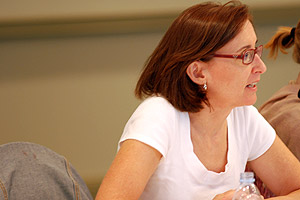
JACQUI SALMON, THE WASHINGTON POST: I wanted to know what you would make of this revivalism in atheism of Stephen’s friend, Christopher Hitchens, and his ilk.
UNIDENTIFIED: All of our friend. (Laughter.)
SALMON: We know that doesn’t mean Americans are converting from devout religious faith to atheism, but they are certainly a lot more outspoken. Does this have any parallel in U.S. history in other areas?
MCCLAY: I’m not sure there is a parallel, although I’m also not sure that it’s really as significant a phenomenon as it seems to those of us who read books and follow the New York Times Book Review. In thinking not so much about the books, but the debates that are held all over the country, the fascinating thing about those, and forgive me to those of you who were sitting with me at lunch since I already said this, is that these are almost always being sponsored by Christian organizations. They are very interested in this kind of thing. They are very interested in engaging in debates.
SALMON: They are very well-attended.
CROMARTIE: Jackie wrote about it for The Washington Post; in fact, she wrote a very balanced, excellent piece in the Post “Style” section.
MCCLAY: Undoubtedly, my view of this has been shaped by reading you, so I’m just feeding it back to you. No, I think this is a sign that, in fact, there’s a certain intellectual self confidence among some Christians. They’re not afraid to subject themselves to a withering examination of their faith, which I think is very good. One of the things I’ve always said is that if Christians want to have a voice in the public square, they have to be willing to take it as well as dish it out. So for people like Hitchens and Dawkins to be very rough in the things they say is quite appropriate because that’s what it means to be in the public square. It shouldn’t be, “Oh, we don’t want to insult people of faith because they have deep convictions.” No, if you want to be in the public square, you have to be willing to be criticized.
So I see it as all positive; I think the books are positive. There’s a certain annoyance that people who are of various degree of hardness in their secularism have been feeling for a number of years, and these books have given expression to that. It’s very gratifying and therapeutic-“Religion is a poison, damn it!”-to have that view out there in an unapologetic way, but there’s not a depth to, at least to Hitchens’ views on the subject. I agree with Stephen that I don’t think he knows a whole lot about what he’s talking about. But he’s not really interested in exploring what he’s talking about.
CROMARTIE: Ross debated him in Nantucket, and he has wonderful stories to tell us about that, right?
ROSS DOUTHAT, THE ATLANTIC: Do I? (Laughter.)
MCCLAY: I think it’s actually a very healthy thing. One of the unhealthy things about our religious culture is its evasiveness, the degree to which so many Americans think that religious questions can essentially be put off to another time: “Do I really have to decide about this now? It doesn’t really matter very much to me.” There is a view that these questions are non-essential. I think that’s absolutely wrong. It both demeans religion and irreligion. At least atheists are people who have made a decision; they’ve taken the question seriously. I think this is why Christians really like them and prefer them to these “oh, whatever,” veil-of-fog types, which is actually what most Americans are, I’m afraid. I think it’s very healthy to have strong voices that take the question seriously out there.
BARONE: I’ll start off with a note on the Kennedys. An argument Kennedy could have made, but wisely chose not to is, “Look, our family bought the Catholic church.” (Laughter.) “They don’t run us; we run them.” Joseph P. Kennedy was perhaps the richest Catholic in the world and let the church know it. He used to bring his girlfriends to dinner with Cardinal Cushing to show who was the top dog in the relationship. (Laughter.)
MCCLAY: As I recall, there is a line in the speech where he says something to the effect that, “I’ll be the sort of the president that no prelate will tell him what to do,” so that gives it added irony.
BARONE: But I wanted to change the subject here and raise a question with you, which perhaps will show my ignorance as I did this morning. You say most reform impulses paid respect to religion. It seems to me that the progressive reformers of the early 20th century-Herbert Croly, Theodore Roosevelt, Woodrow Wilson-
MCCLAY: “We stand at Armageddon. We battle for the Lord.” That’s from the 1912 convention.
BARONE: That’s the 1912 convention. But a lot of the impulse of putting experts in charge of things and taking things out of the hands of-in effect, they moved voter turnout down to expert commissions. You can certainly find examples beyond the Armageddon speech of some respect toward religion. There was a Catholic left-wing tradition that was arguably part of this and sparked, I guess, by the Rerum Novarum of the 1890s and other things.
You mentioned John Dewey paying a certain obeisance to religion, but it seems to me that if we want to put reform movements on a spectrum from heavily influenced by religion to very lightly influenced by religion, that would be the one I would see as on the secular end of that spectrum.
MCCLAY: I think there were certainly progressives who were more or less religious in character, although even Croly-his father was a Comptean, and he was brought up in the religion of humanity-ends The Promise of American Life, a great, foundational, liberal tract, with the invocation of Saint Francis. (Chuckles.) There’s definitely an effort to capitalize-Throughout the book, there are religious allusions he used as ways of thinking about the subject, but also as ways of appealing to people whose sensibilities were shaped by Christian tropes and metaphors.
I didn’t mean to imply that all reform movements are Christian, but I’m very hard-put to think of one that didn’t past muster. That’s why I like this bicameral image and, incidentally, this is why on issues like gay marriage, some of the most important battles are going to be fought in the churches. Because if the churches, overall, take a position one way or other on that issue, then that will go a long way to deciding whether gay marriage can be institutionalized.
ANDREA STONE, USA TODAY: What about the early 20th century labor movement, which was more socialist in some areas? Also, since you’re mentioning it, what about the stem-cell debate in which scientists have been pushing against the church?
MCCLAY: Well, I did qualify it. What I said is, the successful reform movements.
STONE: In terms of union organizing, which has gone on for a long time-
MCCLAY: I rest my case.
STONE: Yes, they are in decline now, but at one point 50 years ago, they were a major force in this country.
MCCLAY: Sure. There certainly are Christian commonwealth elements in the labor movement. The Knights of Labor were heavily Christian-socialist in their rhetoric and in their organizing principles. The AF of L set the pattern much more for what American labor became than the Knights of Labor, but that certainly was an element. People like Edward Bellamy, who was much more of an important figure in the 19th century than we remember him now, operated in a quasi-Christian solidaritist tradition that was more religious than secular in character.
But again, I’m not saying that there are no reform movements that have enjoyed some success that have not been primarily secular in character. But by and large, the big ones, the ones that have really had a lasting effect had to, as I put it, past muster with the prevailing religious sensibilities. My real point is that it’s a very bad strategy to put yourself in opposition to them.
STONE: Would you put the women’s movement and the gay rights movement in there?
UNIDENTIFIED: The anti-war movement?
MCCLAY: The women’s movement, yes, because the women’s movement was successful in the churches. You see almost all of the Protestant denominations have ordination of women now, and women are very much empowered. They are not in Catholic churches, but I think by and large in Protestant churches, you see it.
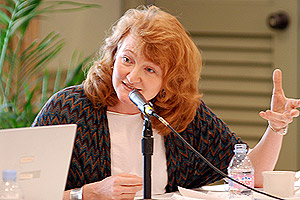
KRISTA TIPPETT, SPEAKING OF FAITH: The Seneca Falls meeting was held in a holiness church, which is a piece of history that is forgotten-
MCCLAY: But Elizabeth Cady Stanton was something of a free thinker, at most. Susan B. Anthony, on the other hand, was a strong believer.
ADELLE BANKS, RELIGION NEWS SERVICE: This is a different topic, from very early in your remarks. I think you said you see the face of evangelicals in lots of places, including Roman Catholicism. If that’s what you said, could you give some examples?
MCCLAY: I didn’t really mean anything very specific except that the liturgical-I’m trying to say this in a very nonjudgmental way-but the liturgical, shall we say, thinning out of Roman Catholic worship seems to me to be very parallel. The feel of many Catholic masses is a lot like the feel of seeker-sensitive Protestant churches.
One of the effects of Vatican II, which I think perhaps was unforeseen, is in emphasizing the horizontal dimension of worship, that it was not just a vertical transaction expressed through the sacraments, but an experience of community; this effect has made Roman Catholic worship more like what you would see in an evangelical church. Also, we have the expression “cafeteria Catholic;” there’s much more of a respect for the individual appropriating church teaching as he or she wishes. I know many Catholics who insist this is a distinctive feature of Catholicism, not aware of the extent to which it is Catholicism capitulating to American individualism and consumerism and voluntarism and all of these other forces. Most of the really powerful justifications for the difference between Roman Catholicism and Protestantism end up going back to questions of authority and structure, which very rarely do you see actually being implemented in practice in the American church.
BANKS: Isn’t it ironic that there are still some of these Catholic-evangelical debates as to what they agree and disagree on when you’re saying that sometimes the evangelicals have actually influenced what Catholics are doing in worship?
MCCLAY: Yes.
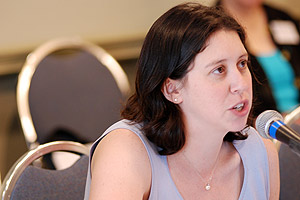
NAOMI SCHAEFER RILEY, THE WALL STREET JOURNAL: I wanted to ask you about two books that have come out recently that seem to address this question of separation. I don’t know if you differ from either of them in your analysis of the issue. The first is Ruth Wisse‘s book about Jews and power. It traces the evolution of Jewish thinking about whether Judaism should render unto Caesar what is Caesar’s, and I wonder if you think the religious minorities in America, as well as the Catholics, have adopted what I think you characterized as a more Protestant understanding of separation and whether that’s a good thing or not.
The second book that has come out that deals with this is Mark Lilla‘s new book. He seems to trace some of the ideas of separation back long before the American founding. I’m not going to be able to accurately explain his argument, but I was wondering if there were threads of ideas of the separation in European intellectual history long before the American founding that you think are important to acknowledge?
MCCLAY: I don’t know Ruth Wisse’s book, but I think that separation is very important for religious minorities because it’s their protection. It’s a protection against forced conversion or marginalization of their religious practices in the majoritarian culture. It’s always been important for American Jews to support a separationist doctrine.
The render-under-Caesar thing is a little different. The separation is a deduction from the idea that the civil magistrate has a power and legitimacy of its own; it doesn’t need to be sanctified by the church. Romans 13 spells all of this out: God gives this power to the magistrate. The magistrate wouldn’t be in charge if it were not divinely ordained.
CROMARTIE: Romans 13 is a book in the New Testament. Is that right?
MCCLAY: This is like Jim Lehrer.
CROMARTIE: I’m sorry, a chapter in a book.
MCCLAY: Naomi knows that. She knows more about Christianity than most Christians.
UNIDENTIFIED: You mean there’s a new testament?
MCCLAY: It’s called the Book of Mormon. (Laughter.) You haven’t heard about the Book of Mormon?
SCHAEFER RILEY: Wait, you didn’t answer my Mark Lilla question.
MCCLAY: I haven’t read Lilla’s book either. That’s one I really should have read. I really shouldn’t comment about it-Well, I know enough about it; I read the long piece he did in the New York Times. He’s very much taken with this notion, which I expressed, too, that the wars of religion were the fundamental agent in bringing about the fact of religious toleration in the West and that our commitment to it is a fragile one because it’s a negative principle. I don’t know whether I’d go that far. I actually think it’s a stronger, more robust commitment than he makes it out to be. But he goes back to the wars of religion as a really important starting place for all of that.
SCHAEFER RILEY: He seemed to suggest there’s a strong temptation that we will always want to use politics to solve our theological problems. I wonder whether you see that strain in America, too, and whether this is a concern, or whether you think we’ve gotten beyond that idea.
MCCLAY: No, I don’t think we’ve gotten beyond that. I don’t think we’ll ever get beyond that idea. I think this is one way that the two-spheres approach of Christianity wars with human nature-there’s a lot of Christianity that self-consciously wars with human nature-because I think that desire to bring one’s metaphysical and political commitments in line with one another is quite natural. Again, this is something where it seems to me Islam has a real problem, that there are these mediating factors in Christianity that are absent in Islam. Even the whole question of the ontological character of the scriptures; this is a fascinating subject that various people have written about. In Judaism and Christianity, but Christianity has articulated it the most clearly, the scriptures are God-breathed; they were inspired, which means that, in some mysterious way, the authors of each of the books have a role. This is part of being an incarnational theology, that somehow the divine will is working, not only through the inspiration, but through the agent that puts the inspiration down on paper.
Whereas for Islam, the Koran is literally dictated, which is why it’s untranslatable and why, in terms of the exegesis, there’s not a whole lot of room to play around with, say, Moses crossing the Red Sea:”This is a metaphor for the soul passing into heaven,” or all the hermeneutical devices that the Christian Bible gave rise to. It’s really the source of a whole hermeneutical tradition of literary criticism, this biblical interpretation. You don’t have that in Islam, so that’s a big problem. They don’t have that fudge factor, that mediator.
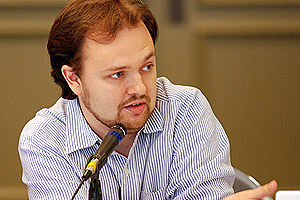
DOUTHAT: I wondered if you could speak to the possibility-and you may dispute the premise of this question-that while American religious life overall has ebbed and flowed, and you have periods of awakening and periods of declining belief, that there seems to be, maybe beginning in the 19th century, maybe beginning in the earlier mid-20th century, a steady secularization of American intellectual life that I think may play a profound role in the shape of religious life in America going forward. I almost wish I had brought this up in the first discussion because I think it does relate, as well, to the decline of religious literacy, that the people who you would expect to be the custodians of religious literacy, the intellectual classes, are less and less interested in religion.
Even among religious intellectuals, if you compare the religious intellectuals of the 1950s to the prominent religious intellectuals of today, with some exceptions, I think you are much more likely to have your well-known religious intellectuals today being dissenters from the orthodoxy of their own religious tradition. We’ve gone from Ronald Knox and C.S. Lewis and Reinhold Niebuhr in mid-century to Garry Wills and Elaine Pagels and Karen Armstrong today. If you think that’s true, do you think it’s reversible, changeable? If not, what does it mean?
MCCLAY: I think you’re right that there has been a steady secularization and specifically de-Christianization of higher education in American life, no doubt about it. I think it reflects the larger currents of Western intellectual history over that period of time. A couple of observations. One, and I maybe should have mentioned this in the previous session, one piece of evidence that the secularism we’re experiencing now may have greater institutional heft, partly because of the academy and the media both being primarily secular in character and not unaggressively so, is the emergence of movements like the orthodox ecumenism of First Things magazine, or the otherwise unthinkable alliance of Jews and evangelicals, partly for political reasons, but partly, I think, for larger reasons of opposing what they see as a militant secularism that is more threatening. They make the judgment that it’s more threatening to them than their confessional or faith differences, which are of time immemorial.
These are quite remarkable developments, the rapprochement between Catholics and Protestants, between Christians and Jews, particularly evangelical Christians and Jews. These are testimony to the perceived power of an ascendant and dominant intellectual secularism. So I think you’re right about that.
On the other hand, I think the example of Habermas and Ratzinger/Benedict’s dialogue suggests to me the possibility, and it’s only a possibility, that in the higher reaches of secularism, it’s begun to exhaust itself intellectually. We may see developments in the years ahead in which we see a post-secular-people have begun to use that term-reemergence of religion that has, in effect, passed through the Enlightenment, passed through the acids of modernity and is still intact, not necessarily in the same form. Just as older religious traditions and commitments were found wanting in certain respects because of the interrogation they received at the hands of the Enlightenment and post-Enlightenment, so the Enlightenment project, as Alasdair MacIntyre and others like to say, is going through its own rolfing, and I think we will emerge at the other end of that with a different view of religion.
It will take a long time for these kinds of things to have ramifications in institutional form. There’s nothing more conservative than the academy, nothing more resistant to change, even though a lot of the disciplinary structures of the academy go back to the 19th century and to assumptions at the founding of the German research-university model that no longer obtain in the way research is done, in the cognitive and epistemological assumptions that people make coming to the work of scholarship.
And yet, the institutions just roll on in the same form with the same departments and the same structure and the same criteria. But eventually, I think there’s a chance those things will change. We’re in a phase where the old way is dying and the new way is powerless to be born. The fact that those are old and familiar words may indicate this could go on for a long time.
But I think you’re quite right. Go back to Benedict for a second. It seems to me that one reason his Regensburg lecture was so important, the one that got the Muslims all angry because he made references to-
UNIDENTIFIED: A Byzantine emperor.
MCCLAY: Yes, a Byzantine emperor, thank you. Using this as an example of what was wrong with the operation of faith detached from reason, and what he called the de-hellenization of faith. But he was equally concerned about the other problem, not just the detachment of reason from faith, but also the detachment of faith from reason. There’s some project going on there, a new scholasticism, a way of bringing these two dimensions, these two cognitive activities back together that I think is a large part of what he is undertaking intellectually. I think it’s something that bears watching.
DOUTHAT: As a religious person who sometimes pretends to be an intellectual, I would like very much for that to be true. But when I look at the American scene now, it seems like the opposite is happening, that the absence of intellectuals in religious communities makes those religious communities increasingly anti-intellectual, which, in turn, makes would-be intellectuals ever less likely to be religious. And so, the divide widens. Particularly you see it in my own Catholic faith; you definitely see it in the mega-church Protestantism we were discussing before. If Joel Osteen is the face of American Christianity, no American academic is going to want to be a Christian.
So I’m skeptical about the prospects for that push. I feel like maybe there was an opportunity with the demise of Marxism, or let’s say the decline of Marxism, in the end of the Cold-War era. But that seems to have slipped away, and I think the popularity of the new atheist manifesto is, in a way, is a sign of-As you said, it’s a sign of the continued vitality of Christian intellectual life that there are Christians who want to debate Christopher Hitchens and Richard Dawkins and so on. But at the same time, I think it’s a sign we now have a generation of intellectuals for whom the very idea of even considering religion is inconceivable. These are people who don’t deal in theology for a living, but, if you talk to professional scientists, for instance, it’s almost as if religion, the language of it, is completely foreign to a whole class.
MCCLAY: I won’t deny that there are always ample reasons for pessimism and seeing American culture as in some way characterized by these countervailing forces. It doesn’t follow from that that people like you and me are going to be very happy with any of the available places to stand in all of that.
VAN BIEMA: [Inaudible] the persistence of atheism. The one study I know that’s been done that actually tried to track atheism among scientists took some data from 1914. I forget how they got it and compared it to now. And it’s remained the same; it’s constant.
SCHAEFER RILEY: I’m just going to offer, very briefly, the self-serving comment that you should go check out some of the religious colleges in America. If you look at the data on scientists and the polling that’s been done about them, and if you survey American intellectual life, you will find a lot more people coming out of a Christian background, people like Mark Noll, being well-heard in the mainstream media more than, say, 10 years ago. So I think there’s a little bit more hope than-
MCCLAY: Can I comment on that? There’s a little Presbyterian college called Covenant College near where I live. I generally lecture there two or even three times a year. The students over there are much better than students I get otherwise. They’re very literate; actually a lot of my students [at the University of Tennessee] are remarkably good readers because they’re brought up in this very Presbyterian-they’re all Presbyterians or Methodists or Baptist-tradition of Bible reading. That’s one feature I’ve noticed as a teacher teaching in a non-elite school, that kids who come out of a Christian background are much more likely to know how to read, in a deeper sense, and to find significance in texts. It’s certainly true at places like Covenant College.
I’ve lectured at other Christian colleges. There are always very impressive students, not necessarily in the sheer intellectual candle power, but with sufficient candle power, and there’s an enthusiasm for learning. I don’t know whether you have found the same thing, but there’s an unjadedness that’s extremely refreshing, particularly when you see the enormous weight of irony and jadedness that prevails in elite schools.
CROMARTIE: Not only has Naomi read about it and thought about it, but she’s written a book about it. The title of that book again, Naomi, is?
SCHAEFER RILEY:God on the Quad.
CROMARTIE:God on the Quad by Naomi Schaefer Riley. If you’ve written a book, at some point during the sessions we’ll be sure to mention everybody’s book. E.J. has a new book now. E.J., you’re up next. What’s the name of your new book?
DIONNE: It’s called Souled Out: Reclaiming Faith and Politics after the Religious Right. But I’ll have to show it tomorrow. It quotes Bill McClay and all kinds of other people, maybe many people at this table.
CROMARTIE: I was just wondering if you had a CD of old Sam and Dave cuts on it.
DIONNE: Actually, my son helped me come up with that title.
I’m more optimistic also; I share Naomi’s view, but I won’t go into that. I just want to say two things very quickly: I will always treasure, “Habermas makes John Dewey sound like Mickey Spillane.” So thank you for that.
MCCLAY: It was un-premeditated.
DIONNE: I can’t wait to see someone quote you from this transcript out of context, “Religion is poison, damn it.” (Laughter.) Now, there was a context, but you did say those words.
I have two questions. You can skip one. But it’s Ross’s question turned on its head. Partly because I like history’s losers, I wonder if you could talk about the Whigs. The Whigs were amazing because they were evangelicals, and they were modernizers. It strikes me that the last 25 years have been the aberration, that it’s actually quite unusual for evangelical religion to be so uniformly associated with the right end of the political spectrum.
We were talking at the break. To answer Mike’s question, William Jennings Bryan was a fundamentalist and progressive on a very long series of issues. I do think the rise of fundamentalism itself is a relatively recent phenomenon in the American sense. The Fundamentals were published in what-1910?-if that had any effect. But I’d like you to talk about that trajectory.
The other question, which you can skip if you want-I love your two secularisms essay. Clearly, we are one end of that; the French are another. Where do you put Germany, Italy and Britain, which are not really secular in either sense and yet have societies that are more secular than ours?
MCCLAY: You’re thinking of the fact that the British still have a state religion?
DIONNE: They have a state religion. The Germans finance religious institutions with tax money and so on. I’m just curious where they fit in your spectrum.
MCCLAY: That is a complicated issue. Certainly, religion lacks vibrancy in the British, the Scandinavian, and, to a lesser extent, the German situations. They validate the American approach, that it’s much better for religion not to be supported by the state. One of the arguments against the faith-based initiative and the use of government funds funneled towards religious institutions is that, in the end, they’ll be bad for them by robbing them of their independence and yoking them to secular government policies.
What was your first question again?
DIONNE: About the Whigs. The last 30 years seem an aberration and if the Whigs are really important in this story-
MCCLAY: I think that’s a great point. We were talking about this in the break. Timothy Smith, one of the great scholars of American evangelicalism who wrote a book in the ’50s, I think, called Revivalism and Social Reform, still in print-It’s a terrific exposition of just how “progressive” these movements were, all of them, not just abolition. They all had a strongly progressive element of challenging the status quo. What evangelicalism has never been-At its core, it is not a faith of complacency, though I think, to some extent, it has become one. But in its “fundamentals,” and I use that word in quotes, it should be.
There’s a way in which evangelicalism takes the whole element of Jesus’ saying, “If you won’t leave your father and mother to follow me, you’re not worthy,” and “I’ll set father against mother and brother against sister” and so on. That whole element of pushing against the natural order to affirm the kingdom of heaven as something different, I think that’s a big part of what evangelicalism, in its original sense, emphasizes, that everything is reordered; everything is made new by conversion. You become adoptive children of God and take yourself out of that biological chain. It’s not a recipe for just affirming the way grandma did it; it’s a recipe for constantly holding up the existing way of doing things against some standard and saying, “We’re falling short; we have to get this right.” So I think it’s only a matter of time, and maybe it’s happening now, that the evangelicals are going to return in some way, shape, or form. It might not be one entirely to your liking or my liking, but they are going to return to a more questioning relationship with the mainstream culture.
DIONNE: Do you have 30 seconds on the Whigs whom I think were really integral in this?
MCCLAY: I’m a big admirer of the Whigs. This is one of Arthur Schlesinger’s sins, that he referred to that period as the “Age of Jackson.” The Whigs are much more interesting than Jackson. I hope Sean Wilentz doesn’t overhear me saying this and come after me. From a certain point of view, they should be seen, much more than Jackson was, as a precursor of the New Deal. The Whig notion was of an activist government and a national conception of America, not organized by states or regions, but a strong sense of nationality, and of the national government as being an active agent in the change of infrastructure.
They had a strong sense of the need for roads and canals as ways of building the nation. They were evangelical, and at least the northern Whigs were anti-slavery. The southern Whigs ended up just shriveling up because they couldn’t contain the contradictions in their perspective.
Daniel Walker Howe’s book is still the best thing going on the political culture of the American Whigs. You know who’s trying to bring back the Whigs is John McCain, with David Brooks as his acolyte, and the whole interest in national greatness. Conservatism tried, I think, unsuccessfully, to appropriate that Whig notion. I’m surprised that the Bush administration didn’t do more with it because they could have, with compassionate conservatism, but they didn’t.
CLAUDIA ANDERSON, THE WEEKLY STANDARD: Bill, I want to ask more about biblical sources of this distinctive American pattern of vibrant religion, but also strong modernities and lots of secularism. You mentioned render unto Caesar and the two cities. Would it also be the case that the picture of Christianity you get in the New Testament, which is a picture of a minority religion and a persecuted minority, where the teaching is explicit that every follower must be prepared to be persecuted-Would it be paradoxically the case that the more Bible-focused the religion, the more comfortable it is with the idea that there’s a secular world out there that is distinct from believers, the idea that Christians are strangers in the world? Is it historically the case that this also was influential in the idea that you could have a vibrant church in the middle of a secular society, and there’s nothing surprising about it, it doesn’t require explanation?
MCCLAY: I think it depends on how the Bible is read. One of the things about both the 17th century New England Puritans and a group as different from them as African-American slaves is their way of reading the Bible saw the great stories as templates for their own experience. In both cases, the crossing of the Red Sea, the exodus, is taken as being emblematic of the great migration to North America or the prospect of emancipation.
That’s a certain way of reading the Bible that’s enormously consoling in times of oppression or difficulty or uncertainty because it gives a narrative in which the chaos of your own life can be made into something that makes sense and has a transcendent grounding to it.
ANDERSON: Specifically on the matter of comfort with being surrounded by secularism or modernity.
CROMARTIE: “Not surprised by it,” is what she said. You’re not surprised that it exists because you know the kingdom is not of this world.
MCCLAY: In Stephen’s discussion of narrative he didn’t put it quite this way, but [a key difference is viewing] the Bible as a collection of propositions that you can draw upon as opposed to [viewing] the Bible as narrative. I’d like to think about it a little bit more, but there’s a different kind of power that comes from being able to take these stories. You see it all the time in 17th century New England sermons; they’re constantly comparing this crop failure to something in the Bible and prooftexting a mile a minute. Of course, their congregations all know exactly what they’re talking about and sit there through these two-hour sermons in a state of raptness.
But it’s different when you’re pulling out propositions, using the Bible as a kind of textbook. The thing that really is at the foundation of a great community is a powerful narrative. What’s kept the Jews together for so long is that the seder is a recounting of the great narrative. When you have that strong sense of a narrative, you have a strong sense of peoplehood. When you don’t, then it tends to be defined in opposition more than out of a sense of identity grounded in something positive.
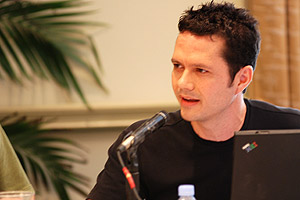
JOHN SINIFF, USA TODAY: Bill, I’d like to piggyback a little bit on what Ross was saying. He did a pretty good job of portraying the intellectual divide because of the secularism in academia. I wonder to what degree you see the secularism in the media and in academia as responsible for contributing to, at least, the political divide that we have today. I also have a follow-up on Romney, which was my original question.
MCCLAY: You mainly want me to comment about the media, I assume, right? I’m of the school of thought that a lot of the sins of the media-and they are many-
CROMARTIE: This room excluded.
MCCLAY: This room excluded, of course; this is la crème de la crème. But those sins are more functions of unreflectiveness than of conscious bias; [they are] reflections of a way of approaching a subject that naturally flows out of the milieu you operate in. As media disaggregate more and more, as you have more of a fragmentation of media, I think that’s probably a good thing in terms of allowing different perspectives to emerge.
There’s a way in which, especially if you go back to the three networks era, that the pressure to come up with a definitive account of things that would be the view of it from every perspective, from no place in particular, is, in a way, too much expect, and that it’s much healthier now to have a sense that different venues are going to have a different characteristic outlook. That’s more in line with what the history of journalism has been. I’m all for objectivity and I don’t view it as a myth. But at the same time, it seems to me a very, very hard ideal, particularly with the complexity of the issues you have to wrestle with.
So I think some of the problem will be addressed, if not solved, by more and different outlets, rather than an effort in the executive suite to decide, “When have we gotten balance on this issue?” I agree completely with the previous speaker about the inanity of most of what passes for point-counterpoint debate. I think it’s very unilluminating for the most part. When you see Mark Shields and David Brooks, who you respect because you know they’re thoughtful men, address an issue of the day on McNeil, that’s much more helpful. But you’re under no illusion that David Brooks or Mark Shields is giving you the view from nowhere. It’s definitely coming through that person.
SINIFF: In many ways what you’re describing is a world in which people have given up on the “mainstream” media for coverage of religion, if it’s disaggregated to the point you’re discussing.
MCCLAY: No, no. I think mainstream media-that’s an aggregating term there-are covering religion more and more because they’ve had to. On balance, I think they’re doing a better and better job of it. So I’m not giving up on that, but I also think there’s a place for CBN, Christianity Today, World Magazine, and these outlets, too. They may not have the same credibility, although in certain circles, they’ll have more credibility than CNN or NBC or whatever. I think there’s value in the proliferation of these outlets that no amount of re-jiggering things to make sure you’ve got the appropriate balance is going to accomplish.
It’s very hard for people to cover subjects for which they have absolutely no sympathy. I do think it’s important to make sure you hire people who have some interest in religion if you want them to cover religion.
CROMARTIE: It’s one of the reasons why we have these conferences.
MCCLAY: You had another question about Romney.
SINIFF: This was after what Katty had asked. As Stephen had said, this may be the case of the more we know, the less tolerant we as a nation will become, coming out of whatever Romney says. Being that I’m impatient, and I’m not going to wait until Thursday, what do you think? Do you think that would be the case, depending on how far he goes into theology? Just the context we will provide in stories as we write about it will give people an insight and a view on Mormonism that perhaps they didn’t have. How do you think that will play out?
MCCLAY: I’m not sure I understood the question, but let me try to answer what I think you were asking. We’re hearing about how this is going to be heartfelt, that he’s writing it himself. I don’t know I agree with the idea that the more you know, the more distrustful you will be. It depends on what you know and what things are important to be able to trust in.
Here, again, I come back to what I said before: I think he needs to find a non-aggrieved way of saying, “I know some people think Mormons are kind of ‘out there,’ but listen, when it comes down to the bread-and-butter things, we’re right in line; we are grateful to be Americans; we love this country, we love X, Y, and Z,” and align himself with, I won’t say the lowest common denominator, but with what I think of as a civil religious substrate of American culture, and avoid getting into theological niceties as much as possible without seeming to be avoiding it.
There’s actually probably a very good way of doing that, by saying, “Look, there are all kinds of ways we disagree about different issues, and we don’t go in and unearth all that and dig that up and talk about, ‘You as a Jew think this; I don’t agree with that and most people don’t agree with that.’ We don’t do this, and there’s a reason why we don’t do it.”
SINIFF: Stephen had suspected it may go badly, and I was just curious if you had the same kind of-
MCCLAY: For one reason or another, this is a subject he has not wanted to deal with. I think it would have been very easy to put all of this behind him quite some time ago. People have been telling him to do it, and he didn’t want to do it. The clear sense I get from when I see him, the few occasions he’s talked about it, is he resents being made to justify his religion and persuade people they shouldn’t feel threatened by it.
If he communicates any of that, he’s not going to help himself at all. I think he has to approach this with the view that it’s for him to persuade us, assuming “us” means those who are skeptical. It’s for him to do that, not for him to make a zinger of an argument that pins us down and shows us to be bigots. I fear a lot of what he’s said up to now is subtly saying, “If you have a problem with me as a Mormon, you’re a bigot.” That just isn’t going to make it, I think. If there’s any taint of that, I think he’s really hurt himself or certainly not helped himself.
ALLEN: Why shouldn’t he feel that way? Why would he feel otherwise?
MCCLAY: I don’t blame him for feeling that way. I’m saying that, in giving a speech, you can be really-I won’t use expletives in front of Mike Cromartie-angry and not get up and speak and say, “I’m angry.” You see what I’m saying. I don’t think there’s any value in him being angry, unless he wants to rehearse the whole history of Mormonism in America, which means he has to rehearse polygamy and a lot of other things he doesn’t want to rehearse.
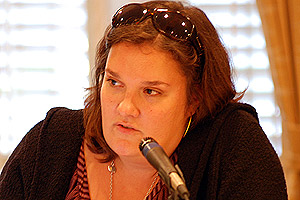
CLAIRE BRINBERG, CNN: My question picks up along these lines that Romney is in a different position from JFK. JFK, if I remember correctly, said in his speech, “I believe in an America where the separation of church and state is absolute.” And Mike Huckabee is appearing with David Barton this week. Romney is running as the candidate of the people that are most suspicious of him, so it puts him in a different position. He has to talk about how his faith influences his politics. That’s what gets him into this Catch-22. Huckabee says that his faith influences every decision he makes, whether it’s about losing weight or abortion or whatnot. So I’m wondering how Romney is going to be able to walk that line, and how you think he can do that.
The second question I have gets to the idea of specifics and how much he should talk about the particularities of the Mormon faith. That’s the whole idea of the prophet, the president of the church, receiving divine revelation, which has obviously instituted and turned back polygamy and also integrated the priesthood. I’ve seen that mentioned as a fear people have of a President Romney. First question: How can he walk that line? And secondly, should he address specifically the whole idea of taking direction from the president of the church?
MCCLAY: To take the second one. That is a tough question, but I think he should certainly suggest that he won’t take direction without-It’s one of those things where you don’t want to say, “I have stopped beating my wife.” Even to raise the suggestion that it’s thinkable that he could take direction from the church-He could hurt himself by saying that. I don’t think he can do that. I like what you say, that he needs to win over the very people who are most suspicious of him, the base that he needs for an eventual victory.
BRINBERG: He’s run as a candidate of faith. He has a video on his website of himself saying grace.
MCCLAY: I don’t know how to answer that except to say, insofar as he’s a political figure and being a person of faith matters for a political figure, which he has already asserted, he has to find a way of affirming that without saying, “Mormons are Christians.” This is exactly what the evangelicals will absolutely not forgive him for doing.
Even Richard Land, who I think-is Richard Land fairly supportive of him?- said the thing to do with Mormonism is to call it the fourth Abrahamic religion, which is a clever way of both acknowledging it, but distinguishing it from Christianity. He has to affirm a commonality, but also not imply an identity between Christianity and Mormonism. I don’t know how you do that.
DAVID SHRIBMAN, PITTSBURGH POST-GAZETTE: I wonder whether the indignity, “I’m insulted by this suggestion,” might not work because he’s otherwise so cool and so processed, it seems, that what would be wrong with him showing some anger about this, if it’s honest anger?
UNIDENTIFIED: [Inaudible] the polls it should be. (Laughter.)
MCCLAY: I’ve got to think about this a little. When Ronald Reagan got angry and said, “I am paying for this microphone,” it wasn’t just that he won people over: He made George Bush look like a wimp. Is there something comparable here, where his losing his temper would score points? It would be great if he could be responding to another candidate. If Mike Huckabee stuck his foot in his mouth and-I think it becomes a question of who the anger is directed at. When Reagan lost his temper, he wasn’t directing it at the audience; he was directing it at Breen or Green or whatever his name was. (Chuckles.) If Romney gets angry, it’s because there are these people out there whose votes he wants who are suspicious of him. He can’t say, “Damn it, you have no right to be suspicious of me; vote for me!” I just don’t see how that is a workable approach.
SCHRIBMAN: He can talk about the American tradition of tolerance and equal opportunity, which is consistent with his message, right?
MCCLAY: That’s right, but I think Claire made a great point about the fact that he’s already used faith as a positive, so he has to find a way of connecting that to-It’s not just, “You should tolerate my weirdness because we have a tradition of tolerating religious weirdness.” It’s “There’s something about my faith that is an asset, that you should like and not merely tolerate.”
CROMARTIE: It’s interesting in this session how much time we’ve spent on what we haven’t heard yet. (Laughter.)
MCCLAY: We’re helping to write these stories.
CROMARTIE: We’re helping him to write the speech. I will make a prediction: He will address none of these doctrinal questions, period. It’s going to be a flat, religious-liberty speech and a little bit about civil religion and that’s that. So a lot of what we’ve said probably doesn’t-
UNIDENTIFIED: Do you think that will work?
CROMARTIE: I’m not saying whether it will work; that’s what he’s going to do. We’ll find out the day after.
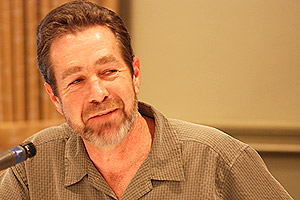
STEVE LAGERFELD, THE WILSON QUARTERLY: First I would say you can find Bill’s essay [in the Summer 2000 issue] where he introduced many of these ideas at wilsonquarterly.com. If you need to, we have it in our archive.
CROMARTIE: What’s it called again?
LAGERFELD: It’s called, “Two Concepts of Secularism.”
Bill, my question is actually about tolerance, to depart from the future back to the past. You’ve given us a history of the two concepts of secularism. But for most people I think who are on the B segment-I can’t remember which letters were the right ones-but for those who are very nervous, or intolerant, in fact, about any inclusion of religious thought, religious currents in public life, the issue really is tolerance. Their concern, of course, is that religion as they see it is a source, the source, of intolerance. We see that, of course, manifested in all kinds of issues where views that are considered tolerant on abortion or stem-cell research or you name it have a religious inspiration in the eyes of many of these people.
So my question is, what about the idea of tolerance and the history of tolerance? Where does that come to us from? Is there a religious basis for that idea? There are obviously all kinds of contradictions in the view of these people, but the idea comes to us-You mentioned some historical antecedents, but they’re earlier than even the American experience. What are they, and are they religious?
CROMARTIE: In two minutes.
MCCLAY: One of the cases I tried to make is that religious tolerance in America and religious tolerance in Europe, too, is not something where an idea of toleration inspired actions by enlightened leaders to create a political, legal system in which toleration was implemented, but that toleration is something that arose out of necessity, that in 16th century Europe, where you have horrible warfare going on-which, by the way, was not necessarily caused by religion; I’ll come back to that-and no religious authority has the ability to define the public realm, then you have a need for some other legitimating power or authority to establish public order. And it can’t be religion anymore when religion is so divided.
So that’s when you come up with the Westphalian idea, and a notion that the civil realm is an autonomous realm, civil-political realm, and religion is something that operates-this actually goes beyond Westphalia-but religion is something that operates in its own sphere.
It’s interesting to me that all of the years I’ve been studying history and seeing the way historians write religion out of history, that every religious event in American history is actually an economic event, for which religion is just serving as the front. There’s a lot of validity to some of this scholarship. But then, when it comes to causing wars and social conflict, religion becomes a primary cause, and that doesn’t seem to make sense to me. If you look at Europe, Reformation 101 says that the Reformation would not have occurred when it did if there hadn’t been a whole slew of economic and social and other forces in play, at the ready to ignite something that could have been just a little theological controversy into something world-shattering. So I have trouble with the idea that religion is as much of a primary cause of social conflict and social change as people like Hitchens seem to assume it is.
This is a joke I’ve told in E.J.’s presence before, but maybe some of you haven’t heard it. A guy is walking down the street in Belfast, and he’s pulled into an alley-way by a guy holding a knife to his throat. He asks him, “Are you a Protestant or a Catholic?” The guy answers, “Actually, I’m an atheist.” And he says, “Well, are you a Protestant atheist or a Catholic atheist?” (Laughter.) That joke means a lot of things, one of which is that the conflict giving rise to this wasn’t fundamentally about religion at all.
COFFEY: A quick question taking the past as prologue. I really enjoyed the history recitation you’ve done. I wonder if you could then take the idea of the bicameral passing of the reform issues, give us a look ahead, and say which issues you think we ought to be looking at that will be the bicameral, great reforms, at least the battles over them, ahead of us. You’ve mentioned gay marriage as one; bioethics, broadly, you’ve touched on; what else should we be looking at?
MCCLAY: Speaking of bioethics is a biggie; there are a multitude of specific issues, each one of which may be decided differently. I think something a little more mundane but of more concern to more people is the whole question of how health insurance is going to be provided to the great mass of Americans, and what kind of programmatic solution to that problem can be found. Obviously, there will be factors in play other than religious ones, and maybe the religious ones will be the least important, but I think, on some level, there needs to be a moral consensus for a solution to be effective and widely accepted.
Let me give you a different slant on this, though. In the ’90s, I was very worried by currents I saw in the Christian world that were strongly separatist. Even in something like Stanley Hauerwas‘ book, Resident Aliens, is the notion of the Christian community having to draw apart from the nation state. You see some of this in the traction of Alasdair MacIntyre’s work. Some of this was generated by frustration that none of the things these folks had been pushing for for so long were happening, and Clinton had been elected and so on. It seemed to me a very worrisome thing that such a large portion of this country could come to be so deeply disaffected. It’s very worrisome to me; whether their disaffection was justified or not, I’m interested in order. (Chuckles.) I’m interested in it all holding together. I have a Lincolnian perspective on this.
Now I think that some of that worry is on the other side of the spectrum. Every time I look at the Daily Kos or something like that, I come away with this sense of fear that that part of the body politic is becoming rabidly disaffected. Again, I won’t make a judgment about the legitimacy of the disaffection, although, when it’s on that scale, it has a legitimacy just by virtue of being as powerful as it is. That kind of social polarization worries me. It may be this is a test case of the ability of the bicameral arrangement to work.
VAN BIEMA: I found your presentation fascinating, and I’ll be thinking about the two different types of secularism for quite awhile. But the issues I’ve written down here have to do with some problem I have with the second one, because it seems to me that, for the most part, you’re presenting the second one as a negative. It also seems to me that the second one has a spectrum, that it is not simply one point of view, but it’s a number of points of view, some of which are more aggressive than others. But oddly enough, the way this came to me was taking issue with a couple of other things.
I have been reading Lamin Sanneh‘s book about the global spread of Christianity, and I had just gotten to the part where the king of Norway had told the king of Iceland that if they didn’t get their act together and become Christian, he was just going to come over with whatever those battle axes were called.
MCCLAY: That’s a bit of evangelical emotionalism there. (Laughter.)
VAN BIEMA: I appreciate this sort of flexibility that both Sanneh and you talk about Christianity as possessing that enables it to go places physically, geographically, and also philosophically that other religions may not be able to. But it’s also possible that that same flexibility allows for acts under some circumstances that are just as annoying to us now in retrospect as what we might claim Islam has done in the name of inflexibility.
David Barton is the WallBuilders guy, right? It disturbs me that Mike Huckabee is spending a lot of time with him, if it’s true that he’s spending a lot of time with him because-
UNIDENTIFIED: Bill Frist got a tour of the Capitol from David Barton.
VAN BIEMA: In that case, it doesn’t bother me. Everybody gets a tour of the Capitol from David Barton, so we can forget that.
I’m also happy to accept the importance of evangelicals in the American Revolution and in the progressive movements of the early 19th century. I know you said that just because somebody isn’t evangelical doesn’t mean they can’t be a reformer, but you couldn’t come up with too many examples.
It seems to me that for a long time, if you wanted to be anything in the United States, it would be in Christian terms. That is, if you were an abolitionist, you would put it in Christian terms. If you were for slavery, you would put it in Christian terms. I’m not denying that there’s a culturally and socially reforming impulse in evangelicalism, but I wonder whether, to some extent, it wasn’t the only language in town for a while. And then, once it ceased to be the only language in town, and, maybe because it was my formative period, I think of the 1960s or 1970s as a moment when even the civil religion began to fade away or be eaten away at-
MCCLAY: Yes, definitely.
VAN BIEMA: If you work from that moment on and talk about reform movements, whether it is the women’s movement post-its beginnings, but really during the bra burning, the period when it obtained some of its greatest successes, or if you look at gay liberation, I’m not certain you find that those were supported by evangelical-(chuckles)-Protestants. I wonder whether there isn’t some proof there that some of the same people who may have issues, who may fall into the B category, are capable of some of the same good things that we’ve attributed to Christians. I also think about godless Jews in the labor movement that was mentioned.
MCCLAY: I think my point was a little different. I really wasn’t making a point about individual reformers. I was making a point about movements; the bicameral legislature is of the society as a whole. There seems to be-and it’s not anything formal-but there seems to be a way in which the reforms that are most successful and most enduring and become uncontroversial are ones that clear both hurdles. Which is another way of saying that something the religious component of the culture wants to push-let’s say not only Roe v. Wade being overturned, but some Supreme Court decision or constitutional amendment that absolutely flips it-
VAN BIEMA: The phrase, one person’s reform is another person’s regression-
MCCLAY: This is not a reform that’s going to succeed because it won’t clear the other house of the bicameral body.
VAN BIEMA: It may have been that I was picking up on a strand you weren’t really putting forth.
MCCLAY: There’s a lot of interesting stuff in what you said-
CROMARTIE: That we can talk about at cocktails- (laughter).
Ladies and gentlemen, we’ve again gone over time and that means that we’ve had a very stimulating discussion. So let’s thank Professor McClay. (Applause.)
* Please note corrections to the following factual inaccuracies in the written transcript, video and audio:
- Wilfred McClay’s Summer 2000 article inThe Wilson Quarterly was incorrectly identified. The correct title was “Two Concepts of Secularism.”
- Professor McClay’s book,The Masterless, was published in 1994, not 1995.
This written transcript has been edited for clarity, spelling and grammar by Andrea Useem.







